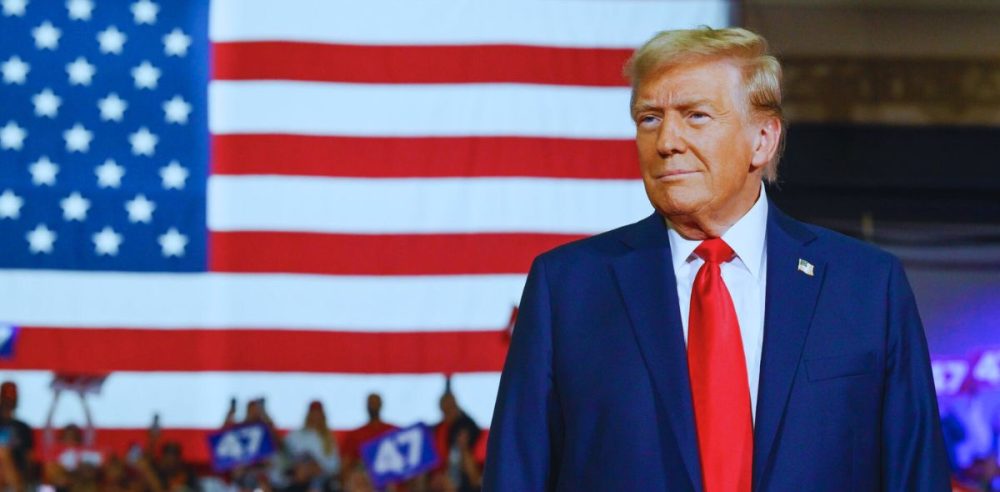In a bold move ahead of his January 2025 inauguration, President-elect Donald Trump has announced plans to issue an executive order targeting U.S. imports from Canada and Mexico.
Trump said he would impose a 25% tariff on all goods entering the U.S. from these countries as a response to what he describes as unprecedented levels of illegal immigration and the growing flow of fentanyl into America.
The president-elect’s statement, posted on November 25 on his Truth Social platform, focused on his frustration with what he calls the “open borders” policies of the United States’ neighbors. Trump argued that both Canada and Mexico could do more and have previously failed to address the challenges explicitly posed by drugs and illegal immigration.
“As everyone is aware, thousands of people are pouring through Mexico and Canada, bringing Crime and Drugs at levels never seen before. Right now a Caravan coming from Mexico, composed of thousands of people, seems to be unstoppable in its quest to come through our currently Open Border. On January 20th, as one of my many first Executive Orders, I will sign all necessary documents to charge Mexico and Canada a 25% Tariff on ALL products coming into the United States, and its ridiculous Open Borders,” Trump wrote.
The president-elect’s comments were accompanied by a focused criticism of Canada’s role in the drug trade, citing reports that fentanyl, often manufactured in China, is smuggled into the U.S. via both Mexico and Canada.
“This Tariff will remain in effect until such time as Drugs, in particular Fentanyl, and all Illegal Aliens stop this Invasion of our Country! Both Mexico and Canada have the absolute right and power to easily solve this long simmering problem. We hereby demand that they use this power, and until such time that they do, it is time for them to pay a very big price!” Trump added.
However, in a joint statement posted on X, Canada’s Deputy Prime Minister Chrystia Freeland and Public Safety Minister Dominic LeBlanc expressed confidence in the strength of the U.S.-Canada relationship and their partnership over the border.
“Canada places the highest priority on border security and the integrity of our shared border. Our relationship today is balanced and mutually beneficial, particularly for American workers. Today, Canada buys more from the United States than China, Japan, France, and the UK combined. Canada is essential to U.S. domestic energy supply, and last year 60 percent of U.S. crude oil imports originated in Canada,” the duo said.
Mexican President Claudia Sheinbaum hinted this week that Mexico may engage in a tit-for-tat tariff fight.
“If there are U.S. tariffs, Mexico would also raise tariffs,” Sheinbaum said in a recent press conference, Reuters reported.
Trump’s announcement also extended to China, where he proposed an additional 10% tariff on Chinese imports, also citing the country’s failure to curb the production and trafficking of fentanyl. The former president expressed frustration that despite previous promises from Beijing to tackle the issue, fentanyl-related deaths in the U.S. have continued to quickly rise.
“I have had many talks with China about the massive amounts of drugs, in particular Fentanyl, being sent into the United States – But to no avail. Representatives of China told me that they would institute their maximum penalty, that of death, for any drug dealers caught doing this but, unfortunately, they never followed through,” Trump posted.
“Until such time as they stop, we will be charging China an additional 10% Tariff, above any additional Tariffs, on all of their many products coming into the United States of America,” he added.
Such tariffs, if implemented, could significantly raise prices on consumer goods, particularly in industries dependent on imports from Canada, Mexico, and China, reported Fox Business. The National Retail Federation (NRF) previously cautioned that broad tariff increases against these countries could lead to higher costs for American families, especially on everyday items like clothing and food.
“The adoption of across-the-board tariffs on consumer goods and other non-strategic imports amounts to a tax on American families,” NFR CEO Matthew Shay said in a statement to FOX Business earlier this month. “It will drive inflation and price increases and will result in job losses.”


